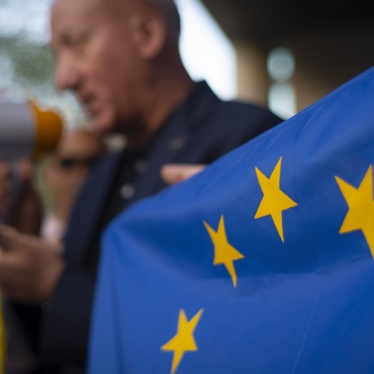There is a stand-alone article in the European Union’s founding Treaty that puts human rights at the core of EU foreign policy. There are authoritative guidelines and a comprehensive action plan on human rights and democracy, adopted by EU governments, to guide the bloc’s external actions.
But somehow, EU Commission President Ursula von der Leyen, who is heading for a second term, managed to almost completely overlook these principles in mission letters she wrote to commissioners-designate who, if confirmed, will lead the bloc’s policy beyond the EU’s borders and candidate countries for the next five years.
Von der Leyen wanted a “geopolitical Commission” during her first term. But she increasingly appears focused on the EU’s perceived short-term interests, notably migration control, access to resources, and transactional politics. She points at engagement with regions closer to Europe – accession and Mediterranean countries – and sees business and trade as the EU’s main external tools. In a July 18 speech, she seemed more resigned to engaging with “dictators and demagogues” than addressing their abuses and pursuing accountability.
A vision that ignores human rights is flawed and counterproductive.
Flawed because it contradicts decades of EU engagement abroad and betrays the hopes and expectations of rights defenders, journalists, and others who stand up for human rights in their countries, often at great personal risk.
Counterproductive because, if von der Leyen wants reliable partners abroad, she should ensure they are also accountable to their own people and respect their rights. Giving up on promoting human rights abroad would embolden oppressive rulers and boost their leverage on the EU – not the other way around.
Von der Leyen’s human rights record attracted criticism during her first term for exposing Europe to well-founded accusations of double standards and undermine its credibility on the world stage. Von der Leyen for instance rightly called for accountability for Russia’s crimes in Ukraine, but failed for months to condemn Israeli authorities’ crimes in Gaza. She also signed a deal with Tunisia’s leader to stop migrants from leaving towards Europe, essentially condemning them to abuses and racism, and stayed silent on the UAE’s support to Sudan’s Rapid Support Forces, whose attacks on civilians have forced thousands to flee, some to the Mediterranean’s shores.
Ahead of her second term, von der Leyen should reaffirm the importance of human rights throughout the EU’s external action. High-Representative-designate Kaja Kallas should also make clear she has the political will to side with defenders and victims, not with their oppressors.
Finally, EU member states and the European Parliament should remind von der Leyen that it is both a treaty obligation and in the EU’s interest to speak up and act against rights violations as a core element of its foreign policy.










